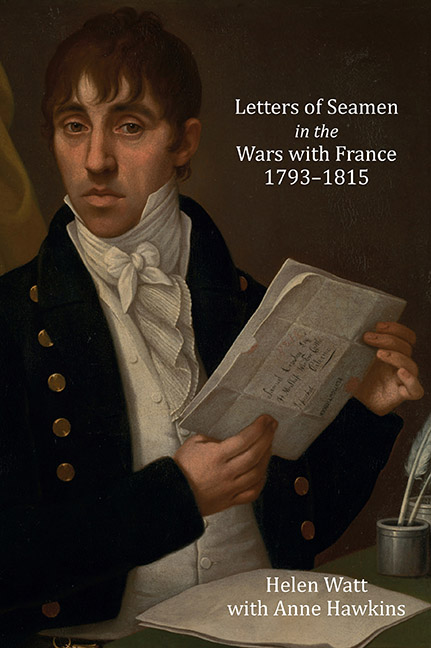Book contents
- Frontmatter
- Dedication
- Contents
- List of Illustrations and Tables
- Foreword
- Preface
- Acknowledgements
- Editorial Conventions
- List of Abbreviations
- Introduction
- Part 1 Thus Dear Father passes the life of a Tar’: Letters of Seamen, 1793–1815
- The Letters A1–194
- Part 2 A great Disturbance among the Fleet’: Letters, Mostly Intercepted, to and from Seamen During the Mutinies in the Royal Navy, 1797
- Letters B1–61
- Conclusion
- Appendix I Biographies
- Appendix II Select Ships Involved in the Mutinies in the Royal Navy, 1797
- Bibliography
- Index
Part 1 - Thus Dear Father passes the life of a Tar’: Letters of Seamen, 1793–1815
Published online by Cambridge University Press: 26 May 2021
- Frontmatter
- Dedication
- Contents
- List of Illustrations and Tables
- Foreword
- Preface
- Acknowledgements
- Editorial Conventions
- List of Abbreviations
- Introduction
- Part 1 Thus Dear Father passes the life of a Tar’: Letters of Seamen, 1793–1815
- The Letters A1–194
- Part 2 A great Disturbance among the Fleet’: Letters, Mostly Intercepted, to and from Seamen During the Mutinies in the Royal Navy, 1797
- Letters B1–61
- Conclusion
- Appendix I Biographies
- Appendix II Select Ships Involved in the Mutinies in the Royal Navy, 1797
- Bibliography
- Index
Summary
The letters of seamen and Marines printed here cover the entire duration of the wars with France, starting with that of Thomas Clements, written shortly after the outbreak of war in 1793, and ending with that of James Thomas, written on board one of the ships accompanying Northumberland (74), taking Napoleon Bonaparte into exile on St Helena in 1815. For the French Revolutionary Wars, 1793–1802, letters of seamen include the magnificent series written by Richard Greenhalgh, spanning not only this period of the wars, but also the length of his service in the Royal Navy. Whereas the letters of most other men have survived individually or in very small groups, almost all Greenhalgh's letters to his parents have survived, forming a rare personal archive. His last letter was written in 1802, and it is not surprising that this is the only letter from that year printed here, given that the short-lived Peace of Amiens lasted from March 1802 to May 1803. When hostilities broke out again, other collections from the Napoleonic Wars, 1803–15, include the smaller groups of letters of John Booth, John Gee Smyth, John Parr, John Martindale Powell and Benjamin Thompson alias Stevenson.
As might be expected, these letters contain details of certain aspects of life on board a British ship of the line, notably contemporary narratives of actions at sea. Most of the major fleet battles of the wars are represented: the Battles of the Glorious First of June, 1794, and Cape St Vincent and Camperdown in 1797; the Battle of the Nile in 1798 and the Battle of Trafalgar in 1805. Other engagements described include Lord Bridport's action off Groix in 1795, Strachan's action in November 1805, Duckworth's action off San Domingo in 1806 and the bombardment of Copenhagen in 1807. Besides the wars with the French, there are also eyewitness accounts of incidents in the War of 1812 with America.
Letters of Marines or, after 1802, Royal Marines, appearing here are fewer in number than those of seamen; there are only three from the French Revolutionary Wars, comprising one letter written during the mutiny at the Nore in 1797; a detailed account of the single-ship action between Mars (74) and L’Hercule (74) in 1798 and a letter written after the Battle of Copenhagen in 1801.
- Type
- Chapter
- Information
- Letters of Seamen in the Wars with France, 1793-1815 , pp. 29 - 74Publisher: Boydell & BrewerPrint publication year: 2014



